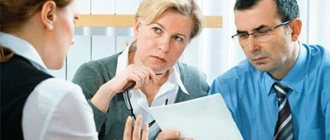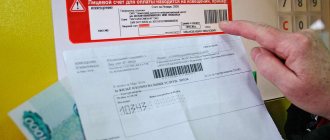What is enforcement proceedings
Property can be seized by a bailiff only if enforcement proceedings have been opened.
The basis is a decision to initiate proceedings and the presence of a writ of execution (court order, writ of execution, resolution of the Federal Tax Service, State Traffic Safety Inspectorate and other authorized bodies), if their demands for payment of money are not fulfilled by the person who is obliged to pay them.
The order to initiate proceedings must be sent to the debtor and other parties to the case via mail. The date of notification of the debtor is the day when the resolution was handed over to him against his signature. From the moment the notification is received, the countdown begins for the period during which the debtor can voluntarily execute the court decision. At this time, as a general rule, compulsory methods of collection are not used.
Exception for the application of compulsory recovery within the period for voluntary execution:
- the debtor did not want to receive a postal notification;
- the postal item was returned due to the absence of the addressee after the deadline;
- The claimant sent the bailiff an application to seize the debtor's property.
Where to run and what to do?
If the user has a mobile notification enabled or monitors the account status from a mobile application, he will receive a notification about the debit.
If desired, you can obtain this data at a bank branch. If a citizen discovers such a write-off, then first of all you need to contact the bank and get a statement about the write-off. If a citizen can prove that the origin of the written-off amount is not known at all, then the court should be on the side of this individual.
If the debt does not raise questions for the card user, then he should remind himself, the court and the bailiff that formally writing off a credit card is not legal.
In practice, charging a credit card is almost impossible. But there is one point.
When the client pays off the debt to the bank for using the card, he replenishes it, but the bank does not write it down immediately. And it is precisely during this short period of time that the bailiff can write off funds from the bank card.
But this situation leads to the fact that the client now remains indebted to the bank.
You need to take a receipt for withdrawing funds from the card or freezing it, which can be obtained from the bank, and contact the bailiff service to find out the reason for the arrest.
The card can be seized for almost any debt, regardless of its size. These may be minor debts to the traffic police or housing and communal services, or there may be serious debts of transport or property taxes.
This amount also includes an enforcement fee, the amount of which depends on the regional administration - the amount of the fee is determined by it.
In such a situation, the main thing is to calm down and begin to act as follows:
- Ask the bank for an additional account where you can transfer loan payments.
- If they do not issue an additional account, you should repay the debt through the cash desk of a financial institution.
- Another way is to pay through a notary deposit.
Russians often ask the question: what to do if bailiffs seize a credit card? First, you should contact your banking organization and ask them to provide some documents:
- presence of debt;
- lending terms;
- a certificate indicating that the card issuance is consistent with the signed credit agreements (i.e., the banking product is not a payment card).
Layoffs and salary cuts are a common occurrence in “bad” times. Often the person who took out the loan does not have the ability to pay it off.
In such cases, a seizure on a credit card should not particularly surprise you. Financial institutions have the right to send cases regarding borrowers who fail to fulfill their obligations for various reasons to the courts.
This situation is not uncommon if a person’s debt becomes overdue.
Before proceeding to challenge the collection, it should be recalled that the decision to block a credit account is made on the basis of a writ of execution. This is not just a piece of paper, but a full-fledged court decision, which is enforceable by bailiffs.
But in practice, can a credit card be seized? Despite the fact that the borrowed money belongs to the bank, the card account is blocked along with the debit account. Such an action is unlawful regardless of the severity of the lawsuit, since the seizure of a credit card leads to serious debts.
The client not only cannot use the loan, but he will also not be able to repay the debt; penalties and large fines appear. In this case, a number of actions should be taken:
- After a message has been received from the bank about blocking the card, it is necessary to raise the lending conditions. You should request a certificate from the institution stating that the account is not a current account. A document is also drawn up confirming the negative balance and the increase in debt.
- Before meeting with bailiffs, you should carefully study the Federal Law governing the seizure of property and bank accounts. At this stage, it is necessary to prepare data confirming the illegal blocking.
- In a conversation with the bailiffs, you should clarify the reason why the blocking was carried out. By agreeing on a repayment plan for the debt that led to the decision to seize the credit card, you can count on the restoration of the special card account.
If a peaceful solution to the issue does not lead to a settlement of the situation, you should go to court to cancel the writ of execution. Be sure to attach papers to the case confirming that the bailiffs did not have the right to seize the credit account. This may be a statement confirming the amount of debt.
Since it may take several weeks or even months until your account is unblocked, you can take the following measures:
- Contact the bank to open a second account to pay the loan.
- To avoid debiting funds, make payments only at a bank branch.
- Through a notary deposit it is also possible to pay debts.
According to the provisions of the Civil Code, the creditor cannot interfere with the client and prevent him from repaying the debt even if it is seized, therefore, in the most difficult situation, fines can be avoided and loan payments can be made on time.
You may ask, does the seizure of a bank card mean that you not only will not be able to withdraw money from your credit card, but also that the funds from it can be written off for debts? Yes, if the court made such a decision, then, having seized the card, the bailiffs will then demand that all funds covering your debt be written off from it.
How to remove a seizure from a card? Firstly, this can only be done by the structure that imposed the arrest - the court or bailiffs leading your case.
Unfortunately, a bank card can be seized very quickly, but it is much more difficult to remove it.
When the available funds are insufficient, the bank suspends operations on the account and carries out execution as funds become available until the debt is fully repaid. That is, in fact, the bailiff can seize any account discovered.
Seizure of a card by bailiffs is one of the methods used by government agencies to pay off a citizen’s debt obligations.
This measure can be applied to salary and credit cards.
Salary
One of the methods used by bailiffs to obtain funds is to seize the card to which wages are transferred.
Every month after receiving wages, 50% of the amount will be seized until the entire debt is repaid.
Credit
Can a credit card be seized? Yes, in this case the seizure also applies to half the amount on the card.
If such a situation occurs, then it will not be possible to get the money back - it will be used to pay off debt obligations.
However, it is possible to prevent repeated write-offs, but to do this you will need to contact the bailiff service.
Without notice
My salary card was seized by bailiffs, what should I do?
How can property be seized?
Seizure of the debtor’s property can be carried out in several stages:
- describe and seize property, draw up the appropriate document;
- evaluate property;
- transfer property for sale (sale at auction, commission sale);
- the implementation procedure itself.
If the property is not sold for any reason, the bailiff must offer the claimant to take the seized item to pay off the debt. If the plaintiff agrees, then an amount equal to 75% of the appraised value of the seized property will be credited to him to pay off the debt. If the claimant refuses to accept the property, then it must be returned to the debtor.
Enforcement proceedings for non-payment of loans, taxes and failure to fulfill other obligations
If the reason for the seizure of a land plot is the owner’s outstanding debts, then it must be borne in mind that such seizure is possible only if the debtor does not have funds in accounts in banks and other financial institutions, including foreign currency.
According to Article 79 of Federal Law No. 229 “On Enforcement Proceedings,” it is impossible to seize a plot if the debtor’s only housing is located on it .
An exception is the case when the property is the subject of a mortgage and can be recovered in accordance with the legislation “On Mortgage”. In essence, this article prohibited the courts from seizing these types of land plots, since, according to the law, they cannot be foreclosed on (that is, sold). At the same time, the debtors themselves could sell such real estate, either in parts or in full, without any problems, because it was not seized. Naturally, the proceeds from such a sale very rarely reached the claimant. In this regard, the Supreme Court of the Russian Federation issued Resolution No. 50 (dated November 17, 2015), stating that the only housing of debtors (including the land plots on which it is located) can still be arrested by court order . And although it is still impossible to sell such property to collect debt, now until the debt is fully repaid, the owner will not be able to take any legal actions with his property. In the future, the Ministry of Justice plans to adopt a law allowing the sale of debtors’ only housing (and therefore land plots, if such housing is located on them) in cases where the living conditions in them significantly exceed the minimum necessary for life.
That is, if the total area of the land plot significantly exceeds the size of the house standing on it, then some part of the land can be cut off and sold to pay off the debt.
Enforcement proceedings and its principles
The proportionality of the amount of debt and the value of the property subject to seizure is one of the main principles when applying measures in the form of seizure of property. The bailiff does not have the right to seize the debtor’s property if its estimated value significantly exceeds the available amount of debt.
The law establishes a list of things that are not subject to seizure at all:
- the only residence of the debtor and his family (apartment, house, other residential premises);
- household items that you cannot do without (a single bed, furniture, dishes, electric and gas appliances for cooking, etc.);
- Kids' things;
- items for individual use (shoes, clothing);
- property for carrying out labor or professional activities;
- state awards, prizes;
- food (in an amount not less than the subsistence level for the defendant and all members of his family;
- livestock feed;
- seed material for seasonal sowing.
Law enforcement practice shows that the above list can include many different things. Whether a bailiff can seize this or that property - in each specific case the approach is individual.
Who can seize a plot and for what?
The court, as well as tax and customs authorities can seize property. The executor of the court decision will be the bailiff, who, on the basis of the relevant order, will receive the right to seize the property specified in the decision. Its owner, in turn, can try to protest this decision.
Naturally, representatives of the above-mentioned structures do not have the right to seize real estate just like that - this sanction is always a consequence of any proceedings or paperwork in relation to the nominal owner or the property itself.
The most common cases are:
- The presence of debts with the owner of the property , the amount of which became the basis for opening a separate enforcement proceeding against him (in this case, the total amount of debt must correlate with the market value of the property planned for seizure). Debts can be of completely different types, ranging from a loan that was not repaid on time, to failure to fulfill obligations to pay taxes and fees on a particularly large scale. This should include, for example, non-payment of alimony.
- The existence of disputes regarding the legitimacy of property ownership . In this case, the land plot may be seized in order to prevent its alienation until a court decision is made. For example, by renting out real estate for long-term lease to interested parties. In such a situation, according to Article 617 of the Civil Code of the Russian Federation, the new owner will not be able to terminate the contract.
Seizure of the debtor's property
The resolution to seize the defendant's property is the basis for seizing the property and drawing up an inventory report. A copy of the resolution must be given to the debtor.
The seizure procedure must be recorded in a special document - an act of seizure (inventory of property). This act must be filled out by the bailiff who is carrying out the arrest procedure, in his own hand as a carbon copy in 2 copies. Seizure of property in enforcement proceedings is not allowed if the amount to be recovered does not exceed 3,000 rubles.
Act on seizure of property
The seizure of property is formalized by an act in which it is necessary to indicate:
- date of compilation;
- basis (no. of proceedings or writ of execution) for making an arrest;
- full details of those present during the arrest: the debtor, other persons (including specialists);
- a list of all seized property. Each item must be described in detail with all characteristics: appearance, presence/absence of damage, check of working condition;
- preliminary (in the opinion of the bailiff) estimated value of the property seized;
- information about witnesses;
- information that the debtor is prohibited from disposing of the seized property;
- how the property will be stored (seized, left for storage by the debtor or transferred to other persons);
- a note that all participants in the procedure have been explained their rights.
All property is inspected by the bailiff personally. The defendant must check the correctness of the information entered and certify the document with his personal signature.
Seizure of property to secure a claim
Seizure of property to secure a claim - this decision is made by the court when the plaintiff in a civil case applies to the court with a statement of claim to seize the debtor’s property before a decision is made on the merits. This measure is necessary to exclude facts of the defendant’s diversion and concealment of property. In such proceedings, the seized property is not transferred for sale, but remains in the debtor’s custody until the case is considered by the court.
Cancellation of arrest
The arrest is lifted by the authority that previously imposed it. The most compelling reasons are the offer of other property as security, the conclusion of a settlement agreement between the violator and the plaintiff.
Through the FSSP
To remove the arrest you must:
- submit a petition (application) to the bailiff or judge to lift the arrest;
- wait for the bailiff to make a decision;
- wait 5 days until the cancellation decision is submitted to Rosreestr.
If the arrest of the share was imposed by the bodies of inquiry in order to preserve the property during investigative actions, removal is possible after the cause of the arrest has been eliminated.
Documentation
To remove the encumbrance, the following documents are submitted:
- decree of the bailiff on the seizure;
- title documents for a share in the apartment;
- statement.
Through the court
When going to court, you must make a statement. Its form and content are similar to the claim (Article 131 of the Code of Civil Procedure of the Russian Federation):
- The “header” indicates the name of the court and the full name of the defendant in the case.
- The main part describes the circumstances under which the arrest was made. The following is the rationale: why it is necessary to remove the encumbrance from the share.
- Request for cancellation of interim measures.
- List of applications.
- Date and signature.
Sample application to court
The court considers applications and evidence supporting the grounds for lifting the arrest.
The decision made by the court is submitted to Rosreestr, where the encumbrance is removed within 5 days .
If the decision to arrest is made in absentia, you can suspend its registration for 3 months by submitting a corresponding application to Rosreestr. At the same time, an application is submitted to the court to cancel the encumbrance.
Example. Citizen Manakina did not agree with the actions of the bailiff, who issued a resolution on the sale of a share in the seized apartment. She appealed to the city and then the district court of the Russian Federation to defend her property interests. M. asked to cancel the bailiff’s order on the sale of the share and lift the arrest. During the process, it turned out that the apartment is communal. The owner's share is 13/63, which allows for the allocation of a room. It was she who was arrested. Manakina did not try to pay off the debt, citing a difficult financial situation. At the same time, she indicated that the bailiff did not take into account the fact that the debtor had the only home that was not the subject of a mortgage. According to the court decision, the actions of the bailiff in selling the share at the auction were declared illegal, but the seizure of the property was not canceled, since the bailiff stated that this measure was necessary to secure the bank’s claim to collect debts from the defendant.
You should not be afraid of seizure of a share in an apartment if the housing is the only place for living. The restriction on disposal is only an incentive to fulfill obligations. However, if the owner of the share has other housing, there is a risk of losing the property, because after the arrest and subsequent evasion of responsibility, the share will go under the hammer.
Are the actions of the bailiff legal when seizing a share in an apartment? How to appeal a decision to seize housing? To avoid imposing encumbrances on real estate, contact a lawyer from the website ros-nasledstvo.ru and get a free consultation.
FREE CONSULTATIONS are available for you! If you want to solve exactly your problem, then
:
- describe your situation to a lawyer in an online chat;
- write a question in the form below;
- call Moscow and Moscow region
- call St. Petersburg and region
Save or share the link on social networks
(
2 ratings, average: 5.00 out of 5)
Author of the article
Natalya Fomicheva
Website expert lawyer. 10 years of experience. Inheritance matters. Family disputes. Housing and land law.
Ask a question Author's rating
Articles written
513
- FREE for a lawyer!
Write your question, our lawyer will prepare an answer for FREE and call you back in 5 minutes.
By submitting data you agree to the Consent to PD processing, PD Processing Policy and User Agreement
Useful information on the topic
19
Eviction from an apartment of an unregistered person, not the owner
A person lives in a residential building without registration, and he…
5
Statement of claim for eviction from an apartment
There can be many reasons for eviction. A careless tenant who in no way...
5
How to evict an illegally living person from an apartment
Often, a stranger who temporarily moves into someone else’s living space, after graduation...
1
What documents are needed to privatize an apartment?
What is needed to privatize an apartment? The list of papers is quite extensive that...
1
Privatization of a garage in a garage cooperative: procedure, general information
Due to the constant increase in the number of vehicles, the question of...
Timing for the privatization of dacha and land plots: until what year has free privatization been extended in Russia
Land privatization is a lengthy and rather complicated procedure that takes…
Is it possible to challenge the actions of the bailiff?
From the moment the act is drawn up, a 10-day period begins so that the debtor can appeal the actions of the bailiff, or to exclude some seized property from the act.
Property that is seized can be excluded from the act if it is not the property of the debtor, pledged property, or is included in the list of property the seizure of which is prohibited by law. Items can only be excluded from the act through a judicial procedure. The debtor sends a statement of claim to the court. If the claim is accepted by the court, the sale of the seized property is suspended. After 10 days, items must be handed over for sale.
Witnesses
When drawing up an act of seizure (inventory of property), there must be at least 2 witnesses - persons who are not interested in the outcome of the case. By their signatures, witnesses must certify that the information included in the act is correct and complete. If an arrest is imposed without witnesses, it may be considered invalid.
Valuation of property upon arrest
During the process when property is seized, the bailiff basically independently evaluates the seized property, taking into account market prices and the degree of deterioration of things. The final price must be fixed in the resolution on the valuation of the seized property; a copy of the resolution is sent to the debtor within 5 days from the date of arrest. In case of disagreement regarding the assessment of the value of property, it is necessary to involve an appraiser. The debtor can appeal the result of the property assessment in court.
Storage of seized property
The seized property can be transferred for storage to the bailiff (if it is seized), the debtor, any other person or to the warehouse of the seized property of the FSSP.
The responsible custodian of the seized property (the person charged with ensuring safety) is warned of criminal liability for damage to property through his fault. If the debtor is appointed as the responsible custodian, he bears criminal liability for attempts to conceal, alienate or deliberately destroy property or part of it. The bailiff has the right to check the safety of property on a monthly basis.
Seizure and foreclosure are not equivalent concepts
As practice shows, many uninformed citizens misinterpret legal terms, and as a result, incorrect interpretation of the law occurs. Meanwhile, the concepts of foreclosure to pay off debt and seizure of the property of a negligent borrower imply completely different consequences.
The term recourse must be understood specifically as the seizure of property, that is, a court or bailiff, on the basis of a decree, can take away the payer’s property so that it can be sold at auction and repay the resulting debt to the claimant. Under such circumstances, the debtor is deprived of his benefits.
And if the debtor’s property is seized, then it is not subject to seizure in the full sense of the word, and therefore it cannot be taken away. The court establishes certain restrictions related to the disposal of the seized apartment; if the borrower has several apartments, then he may be prohibited from living in this area. But as judicial practice shows, often the payer and his family continue to live in a single dwelling while retaining ownership rights. The housing simply goes into the status of restricted or seized. After the borrower has fully repaid the debt, he has the right to contact the arresting authority with a statement and ask to lift the restriction.
According to the legislator, the use of such strict collection measures will prevent transactions with the only real estate by an unscrupulous citizen behind the back of the executors and the creditor.
Attention! Need protection from bailiffs? in the form, go to the online lawyer help , go, today for free !
A brief summary of the conditions on the basis of which the only home can be seized:
- the debtor and family members continue to live in the apartment;
- The bailiff or the court may apply measures at their discretion to prevent the sale of other transactions related to housing. But often such a request is made by the bank (creditor), for reinsurance, since there is no direct opportunity to collect the property for debts, but there are suspicions about the integrity of the borrower;
- in order to prevent registration and occupancy of other residents.
Under such circumstances, it is not possible for debtors to avoid repaying the debt.
Grounds for arrest
Seizure of an apartment is the imposition of a ban on transactions with a property. The procedure is widespread and is used for the following reasons:
- By the tribunal's decision;
- by order of the bailiff (Article 80 of the Federal Law of 2007 No. 229).
A citizen whose property is seized cannot:
- sell;
- give;
- exchange.
Situations in which encumbrance may be applied:
- The object is subject to confiscation by court decision.
- The property must be sold to repay the debt.
- The object is the property of a third party, and the citizen is illegally holding it.
Important! If a seizure is imposed on an object of movable property, then a ban on its use is possible. For example, a car may be sent to an impound lot.
The following property may be seized as security for a debt obligation:
- being in the personal property of a citizen;
- jointly owned by the spouses (in the absence of a marriage contract;
- shared ownership of a citizen and third parties.
| No. | Objects that are not subject to encumbrance |
| 1 | Things needed to earn a professional income (tools, cars, other objects for work) |
| 2 | The only residential premises or share in it |
| 3 | Property of other citizens and family members of the debtor |
The only housing can be seized and sold to repay the debt if the property is pledged to the bank.
Thus, a share in housing can be arrested if:
- This is not the only housing;
- the citizen is the owner of the object;
- the share is pledged to the bank.
Important! Information about the presence/absence of a seizure on a residential premises can be found by receiving an extract from the Unified State Register of Real Estate. The receipt procedure is subject to payment. You can get a paper copy from Rosreestr or MFC (750 rubles), an electronic copy - on the Rosreestr website (400 rubles).
The essence of changes in the debt collection procedure from June 2021
Changes to the legislation on enforcement proceedings were introduced by the Federal Law of February 21, 2019 No. 12-FZ “On Amendments to the Federal Law “On Enforcement Proceedings”. According to it, payments in favor of citizens of a social nature will be exempt from possible collection by bailiffs. The law was signed in February 2021, but provides a delayed date for the entry into force of changes: they will come into force no earlier than June 1, 2021.
Many media outlets, describing the essence of the new law, indicate that it protects pensions and other social benefits from recovery through enforcement proceedings. This is actually not true. The current Federal Law “On Enforcement Proceedings” contains an extensive list of payments that are not allowed to be collected, and the new law changes this list very slightly. That is, social payments that are not subject to penalties still exist today. It is also worth understanding that the pension can still be recovered as part of enforcement proceedings, although with certain nuances.
The innovation additionally protected the rights of debtors through the requirement for mandatory labeling of citizens' income protected from collection. This will prevent the bailiffs from mistakenly seizing social payments, which happens quite often today: the bailiffs do not know the source of the money and block the funds, after which the debtors have to go through a long stage of protesting such a decision and presenting evidence that these funds cannot be collected by law .
Thus, the new law introducing the ban introduces amendments to Federal Law No. 229 “On Enforcement Proceedings,” which contains rules for the forced collection of the FSSP. Changes will be made to Art. 101 229-FZ, which lists payments that are not subject to penalties in enforcement proceedings.









